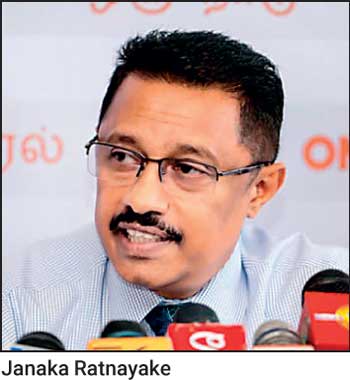Friday Feb 20, 2026
Friday Feb 20, 2026
Saturday, 11 March 2023 00:58 - - {{hitsCtrl.values.hits}}
 Public Utilities Commission (PUCSL) Chairman Janaka Ratnayake in his personal capacity has filed a Fundamental Rights case against what he claimed as “unfair and illegal” electricity tariff hike by the Government via the Ceylon Electricity Board. The FR Application filed was both in his capacity as an electricity user and in the public interest, especially in the interest of those falling within the lowest brackets units of electricity usage who are hardest hit by the tariff hike.
Public Utilities Commission (PUCSL) Chairman Janaka Ratnayake in his personal capacity has filed a Fundamental Rights case against what he claimed as “unfair and illegal” electricity tariff hike by the Government via the Ceylon Electricity Board. The FR Application filed was both in his capacity as an electricity user and in the public interest, especially in the interest of those falling within the lowest brackets units of electricity usage who are hardest hit by the tariff hike.
The Application was supported by Suren Fernando instructed by Mohan Balendra.
The basis of the challenge is twofold.
On the one hand, Ratnayake has challenged the process by which the PUCSL has purportedly approved the tariff hike proposed by the CEB contrary to established legal procedures. The approval of the PUCSL is a necessary requirement for a change in tariffs, and Ratnayake says that there was no such lawful approval of the Commission given to the proposal.
He claims that the purported approval given by the Commission is an unlawful decision of three of the Members and not a decision of the Commission.
The second basis of the challenge is that the PUCSL is duty-bound to ensure that the interests of all citizens are met when approving a change in tariffs. A tariff that disproportionately affects those within lower usage brackets would put those at the lowest income levels at risk of ‘de-electrification’; making even the limited units of electricity used by them for basic necessities inaccessible, argued Ratnayake.
He explains in his Petition that the most economically generated hydropower-based electricity alone (approximately 4,400 GWh) would be more than sufficient to service all domestic users within the 0-30, 31-60 and 61-90 bands, with a significant portion of such electricity remaining for distribution among other categories.
Therefore, it is unreasonable that consumers within these brackets are made to pay the price of electricity generated at a much higher cost, charged Ratnayake.